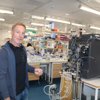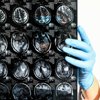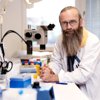Fritextsökning
Artiklar per år
Innehållstyper
-

Ingrid Lönnstedt: What does the p-value mean?
The smaller the better, and preferably smaller than 0.05. A p-value smaller than 5% means that the treatment effect is statistically significant at 5% significance level. But what does that mean? Read Ingrid Lönnstedt´s column to learn more.
-

The art of building a biologic drug
The first biosimilar from Xbrane Biopharma was launched earlier this year, and several more are under development at the company’s facility in Solna, Sweden. “We do everything in-house ‒ from DNA fragments to a final process,” says David Vikström, Chief Technology Officer at the company.
-

Founder of Bioarctic, Lars Lannfelt, is honoured: “I want to create something for the future”
It´s like a scientist’s dream: to be the world’s first with a drug that genuinely affects one of our major diseases. Lars Lannfelt and his company Bioarctic have achieved just that, and they are thus making a significant contribution to the history of Swedish medicine. He is now being awarded the Research!Sweden Award 2023.
-

Positiva röster om nya förslagen kring forskningsfinansiering
I onsdags lades en ny utredning fram med förslag om att i grunden förändra dagens struktur för finansiering av forskning. Life Science Sweden har pratat med flera branschföreträdare som ser positivt på förslagen.
-

The first drugs to slow down Alzheimer’s – but what does it mean for patients?
New treatments for early Alzheimer’s are bringing hope to thousands of patients and their families. The question is, who will get the treatment, how will the right patients be found in time, and will the healthcare system’s resources be sufficient? Life Science Sweden has spoken to Swedish researchers in Alzheimer’s who voice cautious hope but also see further challenges.
-

Astra Zeneca’s Sweden CEO: “We have great faith in our portfolio”
It all started with a summer job as an operator at Astra’s chemical factory in Snäckviken, just outside Södertälje. More than three decades and countless different assignments later, Per Alfredsson, born and raised in Södertälje, is CEO of Astra Zeneca Sweden, which employs 7800 people in Södertälje, Stockholm and Gothenburg. “It was a very special feeling to be in charge of the entire organisation,” he says in an interview about his career and potential future blockbusters.
-

Lundabolag tecknar nordiskt avtal och tar in ny finansiering
Lundbaserade Acucort har tecknat ett avtal med Unimedic om försäljning och marknadsföring av munfilmen Zeqmelit i Sverige, Danmark, Norge och Finland. Samtidigt aviserar bolaget en nyemission för att finansiera en kommersialisering av läkemedlet i USA och EU.
-

Bioarctic granted Japanese patent for Parkinson’s disease candidate
Bioarctic has been granted a Japanese patent for its antibodies targeting Parkinson’s disease.
-

Small robots to deliver pharmaceuticals to the body
Robots that can operate inside the body and a platform that combines ultrasound with AI. These are a couple of the technologies that have qualified for a list that aims to promote sustainable entrepreneurship.
-

CROs in drug development: "We use our expertise to speed up the process
Consultancy firms have become an increasingly important part of drug development. “It’s a trend and a business model that works, and we see no indication that it will change,” says Helena Lüning of the industry organisation ASCRO.
-

Branschens doldisar – kontraktsforskarna
Konsultbolagen har blivit en allt viktigare del av läkemedelsutvecklingen. ”Det är en trend och affärsmodell som fungerar, och vi ser inga tecken på att den kommer att vika“, säger Helena Lüning, branschorganisationen ASCRO.
-

Why the world renown researcher Marc Tessier-Lavigne resigns as Stanford´s president
In mid-summer, neuroscientist Marc Tessier-Lavigne announced his resignation as President of Stanford following allegations of manipulated study data. According to the reporter Theo Baker, who first reported the story, Tessier-Lavigne “rewarded the winners and punished the losers”. Here is the background of the story which has shaken the American scientific community over the summer.
-

Stanfords rektor avgår efter anklagelser om forskningsfusk
Mitt i sommaren meddelade neuroforskaren Marc Tessier-Lavigne att han lämnar sin post som rektor för Stanford efter anklagelser om manipulerade studiedata. ”Han belönade vinnarna och straffade förlorarna”, säger reportern som avslöjade honom. Här är bakgrunden till vad som fick den uppburne forskaren på fall.
-

Lucy Robertshaw: Artificial intelligence – is this really going to transform a patient’s life?
In a column Lucy Robertshaw reflects on how AI and new regulations will affect healthcare, innovation and the lives of future patients.
-

Positiva FDA-signaler om Bioarctics Alzheimerläkemedel
Dokument från den amerikanska läkemedelsmyndigheten FDA släppta inför ett panelmöte på fredag om Eisais och Bioartics Alzheimerbehandling Leqembi (lecanemab) höjer förväntningar på ett fullt godkännande för preparatet. Det rapporterar internationell media på onsdagskvällen.
-

This is the future location of the new national innovation cluster
Mölndal and Goco Health Innovation City will be the site of a new national innovation cluster for advanced therapies. The business community and the Swedish government are splitting the costs of the project, which is expected to produce new treatments for common diseases such as cancer and diabetes.
-

Rapid developments in AI – “All stakeholders are struggling to understand it”
Artificial intelligence is being discussed more and more, and developments in the field are moving rapidly. As the Swedish Medical Products Agency testifies, keeping up with developments is not easy.
-

Olika resultat för Sedanas inhalerade sedering av barn i studie: "Föranleder försiktighet i tolkningen"
En första analys av en fas III-studie med Sedana Medicals inhalationssedering påvisar "non-inferiority" – eller klinisk likvärdighet – för hela analyspopulationen, men inte i per protocol-analysen.
-

Nya Alzheimerdata från konkurrent fick Bioarctics aktie att backa
Det svenska forskningsbolaget Bioarctic, utvecklaren bakom Alzheimersläkemedlet Leqembi (lecanemab), handlades nedåt på börsen på onsdagen efter att amerikanska Eli Lilly presenterat positiva data för konkurrentpreparatet donanemab.
-

Confidence in childhood vaccines is in decline worldwide
Since the pandemic, confidence in vaccinating children has plummeted. In a new report, UNICEF urges world leaders to act before the situation worsens. In 52 out of 55 countries surveyed, public perception of the importance of vaccinating children has declined.
-

Uncertainty about the government’s life science work
The government’s national coordinator for life science, Jenni Nordborg, left her position almost four months ago. No one has yet succeeded her, and now questions are being raised both about the government’s plans for the office and the Swedish life science strategy.
-

Frågetecken om regeringens life science-arbete
För snart fyra månader sedan lämnade regeringens nationella samordnare för life science Jenni Nordborg sitt uppdrag. Ännu har ingen efterträtt henne och nu väcks frågor både om hur regeringen ser på kontoret och på den svenska life science-strategin.
-

Blodtest från Roche ska ge tidig Alzheimersdiagnos
Det schweiziska läkemedels- och diagnostikbolaget Roche har tagit fram ett blodtest som ska underlätta diagnostiken inom Alzheimers sjukdom.
-

Conference on Alzheimer’s reveals several advances in the field
In Gothenburg, Sweden, researchers and pharmaceutical companies from all over the world gathered to discuss one specific issue – neurological diseases. Life Science Sweden has talked to some of those that attended the conference.